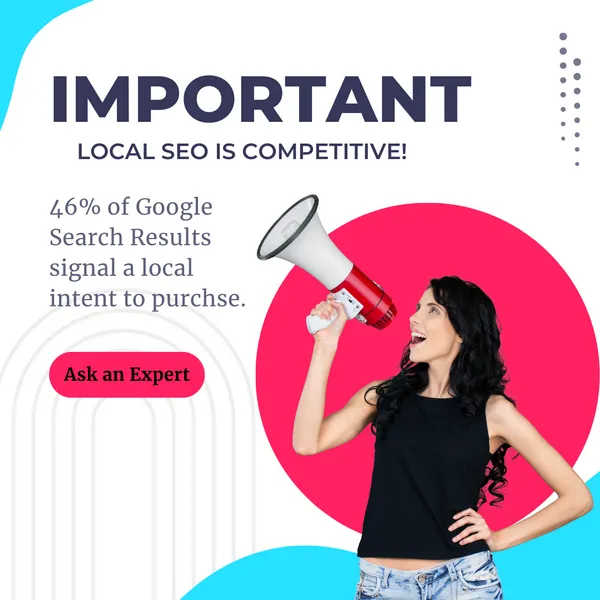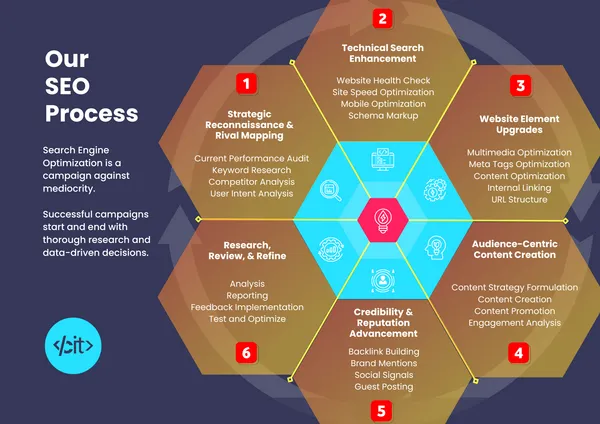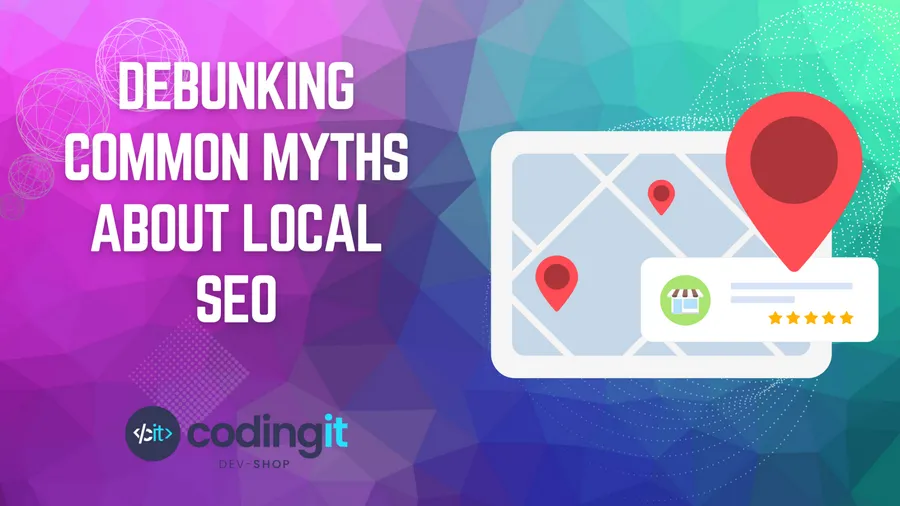You’ve probably found this article looking for understanding on what Local SEO is. In fact, Local SEO can be the magic wand that boosts your business’s online presence and brings in hordes of local customers. But, before you dive into the world of Local SEO, it’s essential to separate fact from fiction.
Hi there! CodingIT is here to help you unravel the mysteries and dispel the myths surrounding this digital wizardry. So, don’t fret if you’re not entirely sure what Local SEO is or if you’ve been fed a few tales about its magic—because we’re about to break it down in a way that’s as clear as day.
You see, Local SEO is not just for small businesses or tech wizards; it’s for everyone who wants to be found on the web by local folks. It’s not about throwing a bunch of keywords and meta tags onto a website and hoping for digital success. It’s about consistent effort, understanding your audience, and adapting to changes as they come.
In this article, we’ll tackle 4 common myths that have shrouded Local SEO in mystery. We’ll reveal why they’re as false as a unicorn in your backyard and why you should know the real deal. So, grab your pitchforks (or, you know, just a comfy chair), and let’s begin demystifying Local SEO together!
- Myth 1: “Local SEO is Only for Small Businesses”
- Myth 2: “Local SEO is a One-Time Effort”
- Myth 3: “Paid Ads Are More Effective Than Local SEO”
- Myth 4: “Negative Reviews Are Always Detrimental”
- Conclusion

Myth 1: “Local SEO is Only for Small Businesses”
Whilst we agree, Local SEO tends to be utilized more often by the smaller brick-and-mortars, Local SEO isn’t exclusive to small businesses; it’s a potent tool that can work wonders for businesses of all sizes, from mom-and-pop shops to corporate giants. Here’s why:
- Relevance for All: Local SEO is about connecting local customers with the products or services they need, and that’s something every business should aim for. Regardless of your size, if you want to be found by people in your community or region, Local SEO is your ticket to online visibility.
- Improved Visibility: In a world dominated by online searches, large corporations often have multiple locations. Local SEO helps them manage and optimize the online presence of each individual branch, increasing their visibility in search results.
- Targeted Marketing: Businesses, regardless of their size, can benefit from the precision of local targeting. Whether it’s offering special deals to local customers or promoting events in a specific region, Local SEO helps tailor marketing efforts to the right audience.
- Competing Locally: Even big players have to compete locally. Large retailers, for example, are continually vying for the attention of customers at each of their locations. Local SEO empowers them to stay competitive at a local level.
- Trust and Credibility: Local SEO isn’t just about keywords; it’s about building trust with your community. Large corporations may struggle with a perceived lack of personal touch. Local SEO allows them to establish that crucial connection with local consumers.
Large corporations are no strangers to the benefits of Local SEO. Here are a couple of real-world examples:
- Walmart: As one of the world’s largest retailers, Walmart utilizes Local SEO to optimize their online presence for various store locations. They provide accurate business information, local deals, and even in-store maps to enhance the shopping experience for local customers.
- Starbucks: This global coffee giant knows the importance of Local SEO. Starbucks uses local search strategies to promote special promotions at nearby stores and to engage with customers through their mobile app, enhancing the in-store experience.
- The Home Depot: With numerous physical stores across the United States, The Home Depot leverages Local SEO to ensure customers can easily find their nearest store. They also use local-specific content and listings to engage with local communities.
These examples highlight that large corporations recognize the value of Local SEO in tailoring their online presence to meet the unique needs of local consumers, making it clear that Local SEO is not just for small businesses, but a vital tool for businesses of all sizes.

Myth 2: “Local SEO is a One-Time Effort”
Local SEO isn’t a one-and-done endeavor; it’s a continuous process that demands your attention over time. Here’s why:
- Changing Algorithms: Search engines like Google regularly update their algorithms. What worked yesterday might not work tomorrow. To stay relevant in search results, you must adapt to these changes.
- Evolving Competitors: Your competitors are also striving to improve their local SEO. To maintain or improve your position, you need to continually refine your strategy.
- Customer Behavior: The way people search and interact online evolves. Staying connected with your audience and adapting your approach is essential to meeting their changing needs.
- Dynamic Market(s): Markets fluctuate, and your business may expand or diversify over time. Your Local SEO strategy must grow with your business to stay effective.
Content is the backbone of any effective Local SEO strategy, and it’s far from a one-time effort. Here’s why ongoing content creation and updates are crucial:
- Freshness Matters: Search engines favor fresh and up-to-date content. Regularly adding new, relevant content to your website, such as blog posts or news updates, signals to search engines that your site is active and valuable.
- Engagement and Value: Consistent content creation provides value to your audience, keeping them engaged and returning to your website. This can lead to more shares and backlinks, both of which boost your SEO.
- Keyword Expansion: As your business evolves, new keywords and phrases may become relevant. Regularly updating your content allows you to target these new keywords, capturing a wider audience.
- Local Relevance: Addressing local events, trends, and community activities through your content demonstrates your engagement with the local community, which is highly valued in Local SEO.
Search engines constantly refine their algorithms to provide users with the most relevant results. Monitoring and adapting to these changes is critical for effective Local SEO:
- Staying Visible: Algorithm updates can impact your website’s visibility in search results. By monitoring these changes, you can quickly adjust your strategy to maintain or improve your rankings.
- Compliance and Penalties: Search engines may introduce new guidelines and penalties for non-compliance. Regular monitoring allows you to avoid penalties by ensuring your website adheres to the latest standards.
- User Experience: Algorithm changes often prioritize user experience. Adapting your website’s design and content to align with these changes can improve user engagement and, consequently, your SEO performance.
- Relevance and Trends: Algorithm updates are often driven by shifts in user behavior and trends. By adapting your content and strategy to match these changes, you stay relevant to your target audience.
Local SEO is a continuous journey that involves ongoing effort, content creation, and adaptation to evolving search engine algorithms. To maintain and improve your local online visibility, it’s essential to embrace the dynamic nature of Local SEO and make it a long-term part of your business strategy.

Myth 3: “Paid Ads Are More Effective Than Local SEO”
While paid advertising can be a valuable component of a marketing strategy, it’s not necessarily more effective than Local SEO. Let’s contrast the two to understand their respective strengths:
- Cost-Effectiveness: Local SEO can provide long-term benefits without the recurring costs of paid advertising. Once you rank well for relevant keywords, you’ll continue to attract organic traffic, reducing your dependency on ad spend.
- Sustainability: Paid ads are temporary, as they rely on your budget. In contrast, Local SEO strategies, such as optimizing your website and Google My Business profile, can provide sustainable results for years to come.
- Credibility: Users often trust organic search results more than paid ads. Ranking well in organic search can establish trust and credibility with your audience, which is essential for long-term success.
- Targeted Traffic: Local SEO allows you to target specific local audiences. Paid advertising can be broad, while Local SEO enables precise targeting, reaching people who are more likely to convert.
- User Intent: Organic search captures users who are actively seeking information or solutions, reflecting higher user intent. This can lead to better engagement and conversions compared to passive ad views.
To further illustrate our point, here are some additional facts that you may not be aware of:
- Google’s Local Pack: According to Google, 46% of all searches have local intent. Local SEO is crucial for businesses looking to tap into this significant portion of search traffic.
- BrightLocal’s Consumer Review Survey: BrightLocal‘s survey found that 88% of consumers trust online reviews as much as personal recommendations. Local SEO can help you manage and optimize your online reviews, which can significantly impact consumer trust and purchase decisions.
- Moz’s Local Ranking Factors: Moz‘s annual Local Ranking Factors study consistently shows the importance of various Local SEO factors, such as Google My Business optimization and online reviews, in ranking well in local search results. The study demonstrates the efficacy of Local SEO strategies.
- Local SEO Impact on Foot Traffic: Research by Google indicates that local searches can lead to in-store visits. According to their data, 50% of consumers who conducted a local search on their smartphone visited a store within a day.
- Growth of “Near Me” Searches: The use of “near me” in search queries has increased significantly. This trend underscores the importance of Local SEO for businesses aiming to capture local customers. Google’s “Micro-Moments” research highlights this shift in consumer behavior.
While paid advertising has its merits and can be very successful, Local SEO offers cost-effectiveness, sustainability, credibility, targeted traffic, and the ability to capture high-intent users. Or simply put, it takes more time, but the rewards can be much further lasting.

Myth 4: “Negative Reviews Are Always Detrimental”
Negative reviews, while initially discouraging, can indeed be turned into opportunities for growth and improvement. Let this sink in: “Consumers don’t want perfection, they want to know you stand behind your work.” Here’s how negative reviews can be turned into opportunities for furthering the brand:
- Feedback for Improvement: Negative reviews often contain specific feedback on what went wrong. Use this information as a roadmap to identify weaknesses and areas for improvement in your business. This can lead to enhanced customer satisfaction and loyalty in the long run.
- Demonstrate Transparency: Responding to negative reviews with empathy and a willingness to address issues demonstrates transparency and a commitment to customer service. Potential customers appreciate this, as it shows you value their opinions and are proactive in resolving problems.
- Trust and Authenticity: A few negative reviews can make your overall review profile seem more authentic. A perfect 5-star rating may raise suspicions. People trust businesses that have a mix of positive and negative reviews, as it appears more genuine.
- Recovery and Retention: Addressing negative reviews effectively and resolving issues can often turn unhappy customers into loyal ones. When you show that you care about their experience and are willing to make amends, customers are more likely to give your business a second chance.
- Learning Opportunities: Negative reviews can provide valuable insights into your customers’ pain points. By addressing these pain points, you can enhance your products or services, making them more appealing to a broader audience.
Need some help taking the leap? Here are some for handling negative feedback effectively:
- Respond Promptly and Professionally: Acknowledge the review promptly and professionally. Express gratitude for the feedback and apologize for any negative experience. Avoid a defensive tone or arguing with the reviewer.
- Take the Conversation Offline: Encourage the reviewer to continue the conversation privately, such as through email or direct messaging, to resolve the issue in a more personal and constructive manner.
- Investigate and Address the Issue: Look into the issue raised and take concrete steps to address it. Be specific in your response about the actions you’re taking to rectify the situation.
- Highlight Positive Aspects: If there are positive aspects mentioned in the negative review, acknowledge and emphasize them. This shows that you value the positive feedback as well.
- Request to Update or Delete the Review: If you successfully resolve the issue, kindly request the customer to update or delete their negative review. Many customers are willing to do this after a satisfactory resolution.
- Consistency is Key: Implement a consistent approach to handling negative reviews across your business. Train your staff to respond in a similar manner to maintain professionalism and continuity.
- Learn and Improve: Use negative reviews as a learning tool. Regularly analyze trends and common issues in negative feedback and take steps to improve your business based on these insights.
- Encourage More Positive Reviews: Encourage satisfied customers to leave positive reviews to help balance out the negative ones. The more positive reviews you accumulate, the less impact a few negative ones will have on your overall rating.
No matter how you personally feel about it, negative reviews can indeed be valuable opportunities for growth and improvement. By handling them effectively and using them as feedback to enhance your business, you can turn a potentially harmful situation into a chance to strengthen your reputation and build better customer relationships.
Conclusion
In this journey through the myths of Local SEO, we’ve uncovered the truth about its boundless potential. It’s not just for small businesses, it’s not a one-time effort, and it’s certainly not outshone by paid ads. We’ve also debunked the idea that negative reviews are a one-way ticket to trouble. Local SEO is a dynamic, ongoing strategy that can deliver remarkable results for businesses of all sizes.
So, if you’re ready to harness the power of Local SEO, turn those myths into opportunities, and watch your online presence soar, don’t wait! Connect with CodingIT’s Local SEO experts today for a FREE AUDIT. Let us guide you on your path to becoming the local legend your business deserves to be. Reach out now and let’s embark on this journey together.
